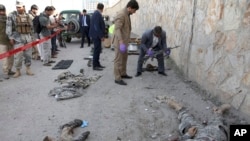A suicide bomber blew himself up near a big gathering of about 2,000 Afghan religious scholars in Kabul Monday, killing at least seven people and wounding many more.
A capital city police spokesman, Hasmatullah Satnikzai, told VOA the attack occurred when hundreds of participants of the meeting of Loya Jirga, or council of elders, were leaving the venue after issuing a joint Islamic decree, or fatwa, outlawing suicide bombings and the ongoing insurgency in Afghanistan.
Islamic State, through its Amaq News Agency, claimed responsibility for the bombing, according to SITE Intelligence group.
The U.S. State Department condemned the "attack on religious leaders and scholars in Kabul who gathered in the name of peace."
Monday's meeting of clerics was organized in support of Afghan government's efforts to try to find a negotiated end to the deadly war.
A top cleric, Ghogranullah Murad, read out the Islamic ruling at the end of the meeting that was broadcast live by Afghan television stations. He said the council of scholars unanimously called on all sides to cease fighting to prevent further destruction and killings of innocent Afghans.
The Taliban must focus on finding a peaceful settlement to the Afghan war, Murad added.
"We, the religious scholars, strongly urge the Taliban to respond positively to the Afghan government's peace talks offer to help end further bloodshed of Muslims," he said.
The council's edict was referring to Afghan President Ashraf Ghani's unconditional peace talks offer to the Taliban, which he announced in February.
While the Taliban has not so far directly responded to Ghani's peace overture, the insurgent group has since indirectly reiterated it would not engage in any intra-Afghan talks until all U.S. and NATO forces withdraw from the country.
"Talking to impotent parties during the presence of occupying forces is pointless," Taliban spokesman Zabihullah Mujahid said last week.
He issued the statement a day after U.S. General John Nicholson, commander of international forces in Afghanistan, stated that some Taliban officials were secretly in contact with the Kabul government to discuss peace options.
"We believe direct negotiations will enable both the sides [the Afghan government and the Taliban] to discuss their differences and demands on the negotiating table to try to find appropriate ways to address them," cleric Murad noted while reading Monday's edict.
But despite the appeal, Murad went on to say, if the Taliban is resolved to continue fighting, then the Afghan council of elders would call on all Islamic countries and religious scholars around the world to intervene and guide "their Afghan Muslim brothers" in the light of Islamic Sharia to end hostilities.
"Only peace can pave the way for withdrawal of foreign forces from the country and there will be no need for international support," he concluded.
The Taliban controls or contests nearly half of Afghanistan and has inflicted unusually high casualties on Afghan security forces in battlefield and other attacks during May. More 600 people were killed in the past month, at least 400 of them were government forces.
Suicide Blast Hits Anti-War Afghan Clerics' Kabul Meeting
- By Ayaz Gul

ISLAMABAD —



